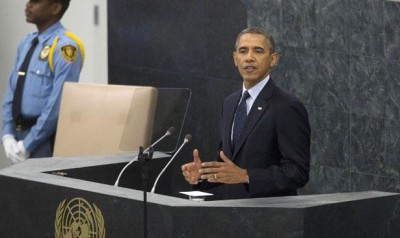This article originally appeared in The Nation’s blog.
 All of a sudden we’re talking to Iran. Now granted that shouldn’t be such an astonishing bombshell. But given the reality of the last several decades, it pretty much is. And that’s all good. It’s been too long coming, it’s still too hesitant, there’s still too much hinting about military force behind it… but we’re talking. Foreign minister to foreign minister, Kerry to Zarif, it’s all a good sign.
All of a sudden we’re talking to Iran. Now granted that shouldn’t be such an astonishing bombshell. But given the reality of the last several decades, it pretty much is. And that’s all good. It’s been too long coming, it’s still too hesitant, there’s still too much hinting about military force behind it… but we’re talking. Foreign minister to foreign minister, Kerry to Zarif, it’s all a good sign.
There were lots of problem areas in the speech—President Obama was right when he said that US policy in the Middle East would lead to charges of “hypocrisy and inconsistency.” US policy—its protection of Israeli violations of international law, its privileging of petro-monarchies over human rights, its coddling of military dictators—remains rank with hypocrisy and inconsistency. And Obama’s speech reflected much of it.
But President Obama’s speech at the United Nations General Assembly reflected some of the extraordinary shifts in global—especially Middle East and most especially Syria-related—politics that have taken shape in the last six or eight weeks. And on Iran, that was good news. Yes the president trotted out his familiar litany that “we are determined to prevent Iran from developing a nuclear weapon.” But this time, there was no “all options on the table” threat. He added explicitly that “we are not seeking regime change and we respect the right of the Iranian people to access peaceful nuclear energy.” The reference to Iran’s right to nuclear energy represented a major shift away from the longstanding claim among many US hawks and the Israeli government that Iran must give up all nuclear enrichment.
Respecting Iran’s right to “access” nuclear energy is still a bit of a dodge, of course—Article IV of the Non-Proliferation Treaty (NPT) recognizes not just access but “the inalienable right of all the Parties to the Treaty to develop research, production and use of nuclear energy for peaceful purposes without discrimination.” Iran is a longstanding signatory to the NPT, and is entitled to all those rights. Obama referred only that “we insist that the Iranian government meet its responsibilities” under the NPT, while saying nothing about Iran’s rights under the treaty. But the high-visibility US recognition of any Iranian right to nuclear power—in the context of a new willingness to open talks—is still enormously important.
It was also important that President Obama spoke of Iran with respect, acknowledging Iranian interests and opinions as legitimate and parallel to Washington’s. He recognized that Iranian mistrust of the US has “deep roots,” referencing (however carefully) the “history of US interference in their affairs and of America’s role in overthrowing an Iranian government during the Cold War.” In fact, his identification of the 1953 US-backed coup that overthrew Iran’s democratically-elected President Mohamed Mossadegh as a product of the Cold War may have been part of an effort to distance himself and his administration from those actions. (It’s a bit disingenuous, of course. The primary rationale for the coup was far more a response to Mossadegh’s nationalization of Iran’s oil than to his ties to the Soviet Union.) … click for more
